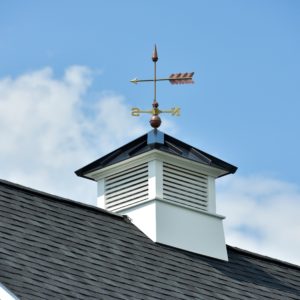Your home is a place of refuge. A place where you and your family should be able to feel safe from the outside world. Part of feeling safe is the protection your home provides from inclement weather. It is shelter in its truest form. In the following post, we’ll discus home building methods and materials to help protect your home and family in the event of a strong storm.

When it comes to stories, less is best.
To begin with, a one story home is more storm resistant than two to three story homes. Being father from the ground puts these homes at greater risk to damage from high winds. Wind damage accounts for a large percentage of weather related incidents. Of course, your home’s exterior materials weigh heavily on their level of protection. A brick home will offer more protection than a wood or siding exterior home.
And if budget is not an issue, reinforced concrete structures are the most storm resistant.
The roof over your head.
Another major factor in a home’s storm protection capability can be found in the roof. Like one storied homes, moderately pitched roofs have less exposure to wind. They reduce uplift and help reduce wind drag. When it comes to roof types, a hip roof is a better choice than a gable roof. Hip roofs have performed better in wind tunnel tests and can even garner an insurance discount. Regardless of the roof type, there are new and better methods of securing the roof to the structure of your home. These include, galvanized-steel hurricane clips, structural straps, ties, and joist hangers.

Impact resistant windows
In a storm with high winds, home damage can result from flying objects. Wind-borne objects can reach speeds of well over 100 mph. Windows are one of the most vulnerable to these projectiles. It’s recommended to install impact resistant windows that break and hold their fragments rather than sending glass through the house. Wood slatted shutters are also a preferred way to protect these areas of your home.
Strong garage doors
Often overlooked, the garage door is a home feature frequently damaged by a storm. Typical two-car garage doors are subject to fail in storms with high winds due to their large size and relatively weak materials. Though they may cost a little extra, there are many storm resistant garage doors on the market.
Keep the water out
Powerful storms bring a large amount of rain with them. This wind driven rain can penetrate a home at points from the roof to the foundation. Properly sealing the roof, windows and doors, as well as ample ground drainage go a long way in protecting your home from water intrusion.
Swinging doors
Keeping doors closed during the high winds of a storm should also be a priority when building a storm resistant home. Doors that swing outwards were shown to drastically out perform the normal in-swing door set up. Doors that fail during storms can result in water damage and even create change in your home’s internal air pressure. This air pressure disruption contributes to the possibility of roof uplift and internal structural damage.
Extreme weather is always a cause for concern when it comes to safety in your home. Current building innovations can be used to strengthen potential weak points to protect your home and more importantly, the people inside it.